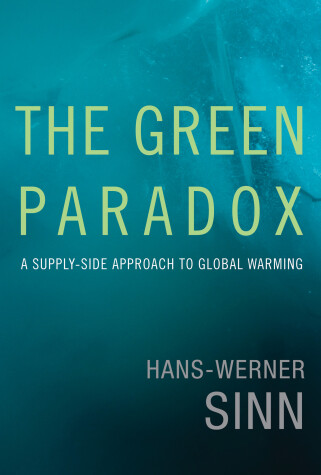The MIT Press
3 total works
A leading economist develops a supply-side approach to fighting climate change that encourages resource owners to leave more of their fossil carbon underground.
The Earth is getting warmer. Yet, as Hans-Werner Sinn points out in this provocative book, the dominant policy approach-which aims to curb consumption of fossil energy-has been ineffective. Despite policy makers' efforts to promote alternative energy, impose emission controls on cars, and enforce tough energy-efficiency standards for buildings, the relentlessly rising curve of CO2 output does not show the slightest downward turn. Some proposed solutions are downright harmful: cultivating crops to make biofuels not only contributes to global warming but also uses resources that should be devoted to feeding the world's hungry. In The Green Paradox, Sinn proposes a new, more pragmatic approach based not on regulating the demand for fossil fuels but on controlling the supply.
The owners of carbon resources, Sinn explains, are pre-empting future regulation by accelerating the production of fossil energy while they can. This is the "Green Paradox": expected future reduction in carbon consumption has the effect of accelerating climate change. Sinn suggests a supply-side solution: inducing the owners of carbon resources to leave more of their wealth underground. He proposes the swift introduction of a "Super-Kyoto" system-gathering all consumer countries into a cartel by means of a worldwide, coordinated cap-and-trade system supported by the levying of source taxes on capital income-to spoil the resource owners' appetite for financial assets.
Only if we can shift our focus from local demand to worldwide supply policies for reducing carbon emissions, Sinn argues, will we have a chance of staving off climate disaster.
, Hans-Werner Sinn, one of Germany's leading economists, takes a frank look at his country's economic problems and proposes welfare- and tax-reform measures aimed at returning Germany to its former vigor and vitality. Germany invented the welfare state in the 1880s when Bismarck introduced government-funded health insurance, disability insurance, and pensions; the German system became a model for other industrialized countries. But, Sinn argues, today's German welfare state has incurred immense fiscal costs and destroyed economic incentives. Unemployment has become so lucrative that the private sector, already under pressure from international low-wage competitors, has increasing difficulties in paying sufficiently attractive wages. Sinn traces many of his country's economic problems to an increasingly intractable conflict between Germany's welfare state and the forces of globalization. "Can Germany Be Saved?" (an updated English-language version of a German bestseller) asks the hard questions - about unions, welfare payments, tax rates, the aging population, and immigration - that all advanced economies need to ask.
Its answers, and its call for a radical rethinking of the welfare state, should stir debate and discussion everywhere.

